

|
Chapter
13 The summer and fall of 1870 would finally find James and Jane reunited. It had been almost ten years since they had lived a quiet life in Corpus Christi with no thought of war on the horizon. Much had happened in those years. James had witnessed firsthand the bloody horror of battle and had taken upon his shoulders the responsibility of leadership and command. Jane had watched her home ravaged by invaders; her family put in constant danger and deprivation, and had taken upon her shoulders the weight of raising three children alone in a world that, at times, seemed like it had come to an end. They were no longer eager young newlyweds. They were both only two years away from turning 40 and they had spent the vast majority of their 14 years of marriage apart from one another. Their children (Fanny, Somerville, and Eudora) were ages eleven, eight, and six respectively. They had no memories of quiet Sunday dinners with both parents at home, and their father was a man they had only seen for brief times under stressful situations. It was going to be a surprising change for the whole family. The first news about employment came from a letter Jane received from Mr. Peirce in August of 1870. (Bold lettering done by me to draw attention to important news.) 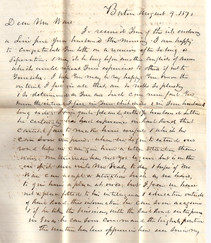 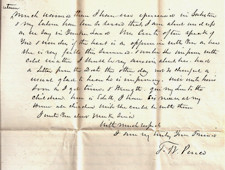
Original letter from T. W. Peirce owned by
James & Judy Ware
213
August 9, 1870 Dear Mrs. Ware, I received yours of the 1st enclosing a line from your husband this morning. I was happy to congratulate you both on a reunion after so long a separation. And may it be long before another conflict of arms which would repeat your experience to others, if not to your selves. I hope you may be very happy. You know the interest I feel in all that, and so noble, plucky, and so determined are you and such can never fail. You know the interest I feel in your children and in your husband’s being exiled. I am quite pleased with your husband's letter. He certainly has had experiences in railroads that cannot fail to make him useful and which he can soon enterprise. When we begin to extend our road lines, we can give him a better situation than now. Our business has not yet begun but is in the eve of it. Will write Mr. Sealy today and hope, if Mr. Ware can accept a situation such as we have, to give him a place at once, but I fear we have not a place fitted to his intelligence and education outside of railroads. This information he can soon acquire and if he likes the business with the railroad enterprise in Texas, he can soon command the highest position. The weather has been oppressive here ever since my return – much warmer than I have ever experienced in? and my labors have been so tired that I am about ‘used up’ as we say in Yankeeland. Mrs. Curtis often speaks of you and wonders if the heat is as oppressive with you as her. She is very feeble this summer and unless she improves with the cold weather, I shall be very anxious about her. Had a letter from the doctor the other day not so cheerful as usual – glad to hear he is improving. I will write him soon as I get time and strength. Give my love to the children. How is Edith? I have six nieces at my house – all children – wish she could be with them. I wrote you about 3 weeks since. With much respect I am very truly your friend, T.W. Peirce (Ref. 233) **
Mrs. Curtis was the mother-in-law of Thomas Wentworth Peirce
214
A month later, in September, they were still discussing the arrangements of employment for James. The couple was now residing in Galveston where it gave Jane a chance to help her elderly uncle who was ill. Mr. Peirce reassured Jane that, although he would be working more from his home back east, he would never sever his ties with his business partners and friends in Galveston completely. 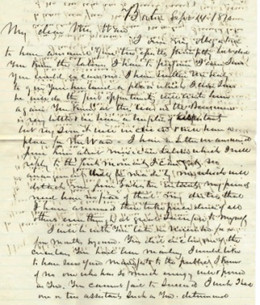 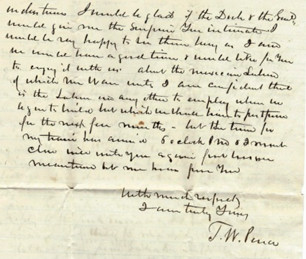 Original
letter from T. W. Peirce
owned by James & Judy Ware Boston September 14, 1870 My dear Mrs. Ware, I own my obligation to have answered your two epistles promptly, but did you know the labors I have to perform, I am sure you would excuse me. I have written Mr. Sealy to give your husband a place which I am sure he will do. At the first opportunity I will write him again. You know at this time in the business there is very little and we have a surplus of applicants but very soon it will -- and we will have a place for Mr. Ware. I have a letter answered from him about Mexican laborers which I will reply to the first moment I can get. No arrangement will be made by me which will detach me from Galveston entirely. My friends need have no fear of that. My duties that I have assumed there take precedence over all others even though at great sacrifice to myself. I will be with you later in November for a few months sojourn. You did enclose one of the circulars you had been mailing. I would like to have seen you 215
manifest it to the public. I know of no one who has so much energy and willpower as you. You cannot fail to succeed. I wish I had one or two assistants such as you - determined and industrious. I would be glad if the Doctor and the General would give me the surprise you intimate. I would be very happy to see them, busy as I am. We would have a good time and would like for you to enjoy it with us. About the Mexican laborers which Mr. Ware writes - I am confident there is - - any other to employ when we begin to build but which we shall have to postpone for the next few months. But the time for my train has arrived 6:00 P.M. and I must leave. Will write you again. In the meantime, let me hear from you. With much respect I am truly your T.W. Peirce ** “The Doctor” was referring to Jane’s Uncle William Smith By the close of 1870, James had obviously been employed but, sadly, his job required him to travel a lot and still be absent from home. This was the case for many men after the war. Mr. Peirce became the “go between” for letters that the couple exchanged because James seldom had a permanent address. He mentions to Jane in the letter below that he had contact with James right before he had to leave on a surveying expedition and was able to give Jane’s letter to him. Her husband did not have time to write back himself before he departed, but it is clear that he requested Mr. Peirce to deliver something to her from him – in all likelihood a most welcomed pay check. Peirce provides an address in Columbus where Jane could write in the future and have her mail forwarded to her husband. The old year ended much the way it had begun – with miles separating the couple again. 216
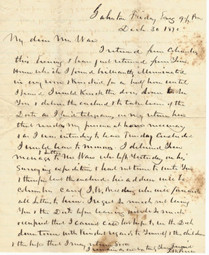
Galveston Friday Evening 9 ½ p.m. December 30, 1870 My Dear Mrs. Ware, I returned from Columbus this evening and have just returned from your home which I found brilliantly illuminated in every room and knocked for a half hour until I feared I would knock the door down to see you and deliver the enclosed and to take view of the doctor as I find telegrams on my return now render my presence at home necessary and as I was intending to leave Tuesday, concluded I would leave tomorrow. I delivered your message and letters to Mr. Ware who left yesterday on his surveying expedition and had not time to write you and therefore sent the enclosed. His address will be Columbus, care of T. W. ? who will forward all letters to him. I regret so much not seeing you and the Doctor before leaving. Will be so much occupied that I cannot call but hope to see the Doctor downtown. With kindest regards to yourself and the children and the hope that I may return soon I remain, as ever truly, your friend, T. W. Peirce From the sounds of the next letter Jane received from Mr. Peirce, which was dated February 11, 1871, the surveying expedition that James had been sent on kept him away from home for quite a while. Peirce even wrote that he was worried about them and assumed that they had encountered bad weather or much suffering. Once again, it was Jane’s lot in life to wait and worry. It also meant that she had not received any money from James for two months, so it was only her teaching salary that was keeping the family afloat. 217
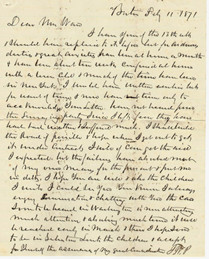
Boston February 11, 1871 Dear Mrs. Ware, I have yours of the 13th inst. and would have replied to it before but for arduous duties and great anxiety. Have been at home a month and have been about ten weeks confined at home with a cold and much of the time, have been in New York. I would have written earlier but for want of time and now have time only to acknowledge your letter. Have not heard from the surveying party since I left - fear they have had bad weather and suffered much. I shall build the road if possible and hope when I get out to get it under contract. I will, if can, get the wire I expected, but that failures have absorbed most of my own money for the present and put me in debt. I hope you are well and also the children. I wish I could see you. You know I always enjoy conversation and chatting with you. The case soon to be heard in Washington is now attracting much attention and absorbing much time. It will be reached early in March and then I hope I can be in Galveston. Send the children and accept for yourself the assurance of my great affection. T. W. Peirce ** The case that Peirce was referring to in Washington was one dealing with the railroads. By March, the expedition party finally made it back. From the following letter Jane received from Mr. Peirce at that time, he was, indeed, able to make it to Galveston but he did not get to see the 218
Wares. James and Jane had both decided to move back to their old
home in Corpus Christi. The railroad business had obviously lost
any appeal for the Wares after that last expedition, and one can be
sure that Jane was very tired of worrying. James wanted to go
back to his first love - the law profession. The coming months
would open many doors in civic and political arenas, and James even
served on the Democratic State Executive Committee – something he could
not have accomplished if he had stayed with the railroad. In the
following letters from Peirce in March and September, he clearly wished
them well as they made the transition. 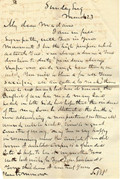
Original letter from T. W. Peirce
owned by James & Judy Ware Sunday Evening March 23rd My Dear Madam, I am in full sympathy with you in your movements and in the high purposes which attracts you. I have always admired ‘your devotion to duty.’ Pain does not always shape our ends – rough hewn them as we will. You will be blessed for all your sacrifices. All are called to make them. There is no heart but hasn’t sorrows. The conflict of war has made many sad hearts on both sides but hope that the endurance of this may soon be obliterated. The South is now assuming a new position and in time all wounds will be healed. Time is a great corrector of wrong. May you be very happy in resuming anew the comforts of an old home. I was told Corpus is a splendid site. I hope to visit in another year. With best wishes for you and your husband and your children, I am truly yours, T.W. Peirce 219
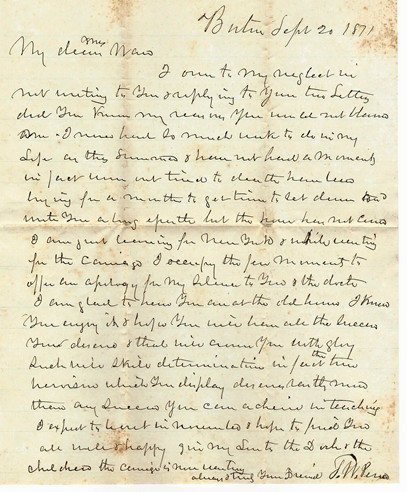
Boston September 20, 1871 My dear Mrs. Ware, I own to my neglect in not writing to you and replying to your two letters. Did you know my reasons, you would not blame me. I never had so much work to do in my life as this summer and have not had a moment, in fact none, but tired to death. Nevertheless, trying for a month to get time to sit down and write you a long epistle, but the hour has not come. I am just leaving for New York and while waiting for the carriage, I occupy the few moments to offer you an apology for my silence to you and the doctor. I am glad to hear you are at the old house. I know you enjoy it and hope you will have all the success you deserve and that will cover you with glory. Such will, with determination (in fact, the true heroism that you display) deserves certainly more reward than any success you achieved in teaching. I expect to visit in November and hope to find you all well and happy. Give my love to the doctor and the children. The carriage is now empty. Always and truly your friend, T. W. Peirce 220
|
|
This site maintained by John Reagan |